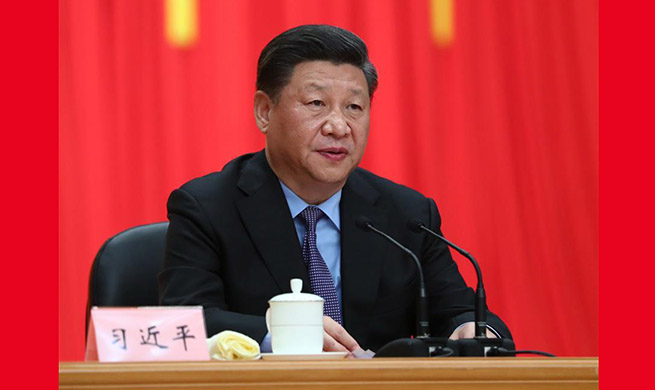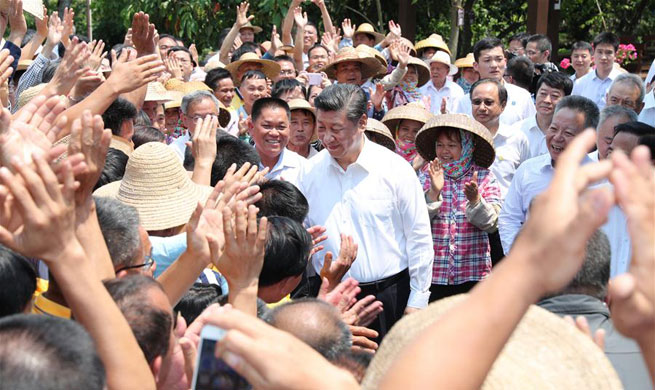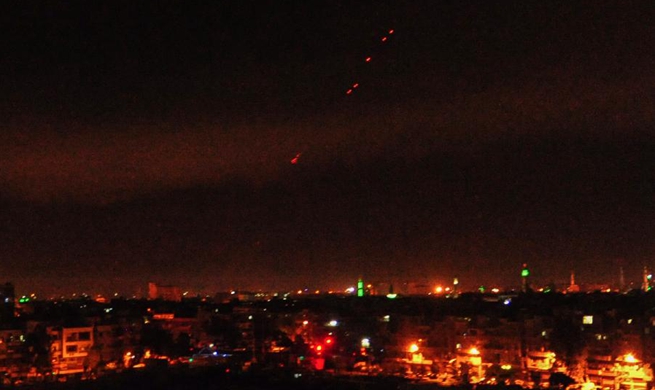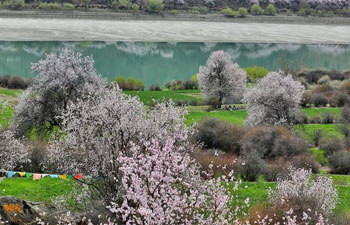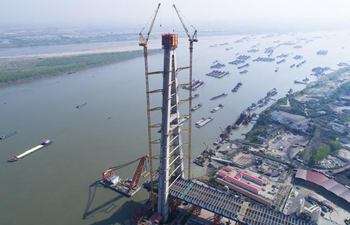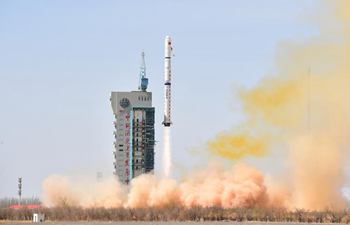DAMASCUS, April 14 (Xinhua) -- At 3:55 a.m. local time (0055 GMT) on Saturday, the United States, Britain and France launched a missile attack on military positions in Syrian capital Damascus and the central province of Homs to retaliate for the Syrian government's alleged use of chemical weapons in a rebel-held district east of Damascus last week.
People in Damascus woke up to the sounds of explosions before daybreak, watching red dots flying from earth to the sky, which later appeared to be the air defense responding to around 110 missiles launched by the three Western nations on Syrian military sites.
The Syrian army said in a statement that the air defense system has intercepted most of the missiles, stressing its resolution to continue fighting the foreign-backed terrorism in Syria.
For its part, the Russian Defense Ministry said the defense system intercepted 71 out of 103 missiles launched by the Western forces, giving extra details about the intercepted missiles.
Among the intercepted missiles, four targeted the International Airport of Damascus, 12 were meant to hit the Dumair air base in the countryside of Damascus, and 18 were destroyed before reaching the Beli air base, according to the Russian Defense Ministry statement.
It added five missiles were intercepted out of a total of nine that targeted the Mazzeh district west of Damascus.
Also, 30 missiles targeted Jamraya and Barzeh and the air defense destroyed seven of them while the rest hit their targets.
As for the province of Homs, the air defense system shot down all 12 missiles before reaching the Shuairat air base, the same air base that was targeted last April by the U.S. over similar allegations of chemical weapons use against the Syrian government.
Also in Homs, the air defense deterred 13 out of 16 missiles that targeted the Homs air base.
The attacks came just before the arrival of the international investigators of the Organization for the Prohibition of Chemical Weapons (OPCW), who are supposed to visit the district of Douma, where the alleged gas attack took place last Saturday.
The Syrian Foreign Ministry said the U.S.-led missile attack was meant to impede the work of the OPCW investigation team, in order to cover the U.S. lies and fabrications about the alleged chemical weapon attack in Douma.
The United States and its Western allies accused the Syrian government of adopting chlorine gas in the latter's recent military operation in Douma, which left civilians to suffocate.
The Syrian government has repeatedly denied the allegations, claiming the rebels were fabricating it to draw foreign military action to Eastern Ghouta, the last rebel bastion east of the capital.
Syrian President Bashar al-Assad said that the U.S.-led attack reflects the failure of the Western powers to achieve their goals in Syria after the defeat of the foreign-backed rebel militants, according to Syrian state news agency SANA.
Assad made the remarks during a phone call with Iranian President Hassan Rouhani, who called Assad after the U.S-led strike on Syria, according to SANA.
"The attack took place after the colonial forces which support the terrorists realized that they have lost control... and that they have lost their credibility in front of their people and the world," said Assad.
He stressed his country's firm determination to continue fighting terrorism across Syria.
For his part, Rouhani expressed his strongest condemnation against the attack, stressing Iran's support for Syria.
The Iranian Foreign Ministry also strongly condemned the U.S., Britain and France for launching the airstrikes against Syria, calling the attack "a clear violation of international regulations and destruction to Syria's national sovereignty and integrity."
Russia, another key ally of the Syrian government, also condemned the attack.
Russian President Vladimir Putin called the missile strikes "an act of aggression against a sovereignty" which violates the United Nations' charter.
Russia has also called for an immediate UN Security Council meeting to discuss the "aggressive actions" of the United States and its allies, he said.
U.S. President Donald Trump on Saturday ordered the U.S. armed forces to launch precision strikes on targets of the Syrian army that were associated with its chemical weapon capabilities.
U.S. Defense Secretary James Mattis said the Saturday's attack was a "one-time shot" to deliver a "strong" message to the Damascus regime.
But in Damascus, people carried on with their daily routine without difficulties after they woke up to the huge explosion sounds.
Earlier on Saturday, dozens of people gathered at the Umayyad Square in the heart of the capital, chanting for Assad and the Syrian army while condemning the U.S.-led attack.










